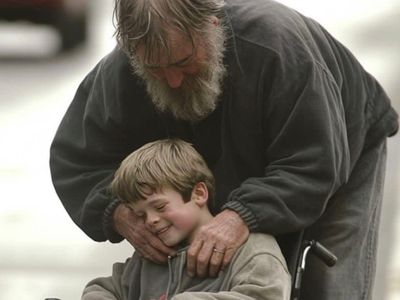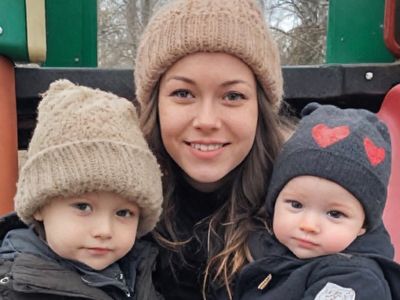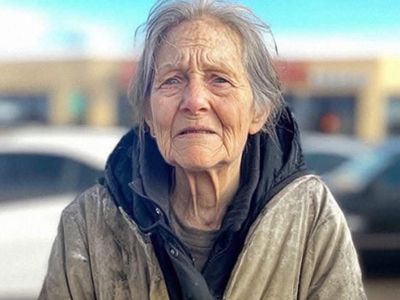Disabled Homeless Man Gave His Wheelchair to a Poor Boy Who Couldn’t Walk – 5 Years Later, the Boy Found Him to Repay His Kindness
A destitute, disabled flutist gives up his only means of mobility—his wheelchair—for an eight-year-old child who cannot walk, masking his own suffering with a fabricated truth. Half a decade later, the boy returns, standing tall, bearing a gift destined to transform everything.
I was stationed at my usual spot in the bustling city square when I first encountered the child. My fingers instinctively traveled across the flute’s holes, each note flowing effortlessly, while my thoughts drifted elsewhere, as they often did during my daily performances.
Spending fifteen years without a home forces you to find solace in whatever you can, and for me, music was the sole refuge from the persistent ache gnawing at my lower spine and hips. With my eyes closed, I allowed the melody to transport me to a different era, a different existence.
Once, I had been a factory worker. The labor was strenuous, but I relished the steady rhythm of the work, the way one’s body could slip into an almost hypnotic cadence, akin to a dance.
Then, the pain began. I was in my mid-forties, attributing it at first to aging. However, when the simplest tasks became unbearable, I realized it was time to seek medical advice.
“… a chronic illness that will progressively deteriorate,” the physician informed me. “Especially with the kind of physical labor you do. There are medications to help manage the discomfort, but I’m afraid there’s no definitive cure.”
Shock consumed me. The very next day, I approached my supervisor, pleading to be reassigned within the factory.
“I could assist in quality control or oversee shipments,” I suggested, my voice laced with desperation.
He merely shook his head. “I wish I could help, but company policy prevents us from filling those positions without the necessary certification. The upper management won’t approve it.”
I clung to my position for as long as I could, but in the end, they dismissed me—deeming me incapable of fulfilling my role. By then, my colleagues were well aware of my condition and the toll it took on me.
On my final day at work, they presented me with a parting gift—one I would cherish for the rest of my days: my wheelchair.
A child’s voice abruptly shattered my reverie, pulling me back to reality.
“Mama, listen! It’s so beautiful!”
Opening my eyes, I realized a small crowd had gathered. Among them stood a weary-looking woman cradling a boy no older than eight.
His eyes sparkled with awe as he watched my fingers dance across the flute. His mother’s face bore the weight of exhaustion, yet when she saw his fascination, something in her expression softened.
“Can we stay just a little longer?” the boy pleaded, tugging at his mother’s tattered coat. “Please? I’ve never heard anything like this before.”
Adjusting her hold on him, she tried to mask her fatigue. “A few more minutes, Tommy. We have to get you to your appointment.”
“But Mama, look at his hands! It’s like magic.”
Lowering my flute, I motioned toward the child. “Would you like to try? I could show you a simple tune.”
Tommy’s face fell. “I can’t stand. It hurts too much.”
His mother held him closer.
“We don’t have the means to afford crutches or a wheelchair,” she admitted, her voice barely audible. “So I carry him everywhere. The doctors say he needs therapy, but…” She let the sentence die on her lips, the unspoken burdens evident in her weary eyes.
Gazing at them, I saw a reflection of my own struggles. The endless pain, the battle for dignity, the way society barely acknowledges the existence of those who are both poor and disabled.
Yet in Tommy’s eyes, I glimpsed something I had lost long ago—hope. The joy that illuminated his face as he listened to my music reminded me why I played in the first place.
“How long have you been carrying him?” I asked, though I feared the answer.
“Three years now,” she murmured.
I recalled the moment my co-workers had presented me with the wheelchair, the kindness they had shown in my darkest hour. And in that instant, I knew what I had to do.
Before I could talk myself out of it, I grasped the armrests of my wheelchair and pushed myself upright. Pain seared through my spine and hips, but I forced a cheerful expression.
“Take my wheelchair,” I said. “I… I don’t really need it. It’s more of a convenience. I can manage without it. But it could make things easier for both of you.”
Her eyes widened in shock. “Oh no, we couldn’t possibly…”
She scrutinized me closely, as if sensing my deception. But I widened my grin, shuffling forward while pushing the chair in front of me.
“Please,” I urged. “I would be happier knowing it’s being used by someone who truly needs it. Music isn’t the only gift we can share.”
Tommy’s mouth dropped open. “Really, Mister? You mean it?”
I nodded, unable to find my voice through the pain, barely keeping my smile intact.
His mother’s eyes shimmered with unshed tears as she gingerly settled Tommy into the wheelchair.
“I don’t know how to thank you. We’ve begged for help so many times, but no one ever…”
“Seeing you both smile is more than enough,” I said, watching as Tommy eagerly experimented with the wheels.
Tears pricked my eyes as I watched them depart. Moving with agonizing slowness, I shuffled to a nearby bench and collapsed onto it, no longer pretending that my body wasn’t screaming in protest.
That was five years ago. Since then, my condition has worsened. The strain of maneuvering on crutches has only deepened the agony.
Pain is my constant companion now—a relentless torment that follows me from the decrepit basement I call home to the square where I play.
Still, I continue. The music no longer numbs my suffering as it once did, but it grants me a reason to endure.
I often wondered what became of Tommy and his mother, praying my sacrifice had brought them a better life. In quieter moments, I envisioned him racing through a playground in my old wheelchair, his mother standing taller, free from the burden of carrying him everywhere.
Then came the day that altered everything.
I was mid-performance, lost in a tune my grandmother had once taught me, when a shadow loomed over my donation cup.
Looking up, I found a well-dressed teenager standing before me, a long package tucked under his arm.
“Hello, sir,” he greeted, a familiar warmth in his smile. “Do you remember me?”
I squinted, my breath catching in my throat as recognition struck. “You?”
His grin widened. “I hoped you’d recall me.”
“But how…” I gestured at his steady stance. “You’re walking!”
“Life is unpredictable,” he said, settling onto the bench beside me. “A few months after you gifted me your wheelchair, we discovered a distant relative had left me an inheritance. Suddenly, we could afford proper medical treatment. It turns out my condition was completely treatable.”
“And your mother?”
“She finally pursued her dream. She runs a catering business now. Cooking was always her passion, but before, she never had the energy. Now, she’s thriving.” Tommy turned to me then, holding out the package with an almost nervous expression. “This is for you, sir.”
I peeled back the brown paper and inhaled sharply. Nestled inside was an elegant flute case.
“This is my way of thanking you,” he said. “For giving me hope when no one else would.”
“I… I don’t know what to say,” I murmured. “This is too much.”
“No, it’s not. You changed my life,” Tommy replied, wrapping me in a gentle embrace. “That wheelchair didn’t just help me move—it gave my family a reason to believe in a better future.”
He didn’t linger after that. I placed the flute case into my tattered backpack and continued my routine.
That evening, back in my dim basement, I cautiously unlatched the case. Instead of a flute, I found meticulously arranged stacks of cash—more than I had ever possessed. Resting atop them was a handwritten note:
“FOR THE SUFFERING YOU ENDURED OUT OF KINDNESS. Thank you for proving that miracles still exist.”
I sat in silence for hours, clutching the note, reflecting on every excruciating step I had taken since surrendering my wheelchair.
But I also thought of Tommy’s laughter, his mother’s tearful gratitude, and the new life they had built.
The money in my hands wasn’t just currency. It was a testament to how a single act of compassion could ignite a chain of miracles.
“One moment of kindness,” I whispered to myself as twilight crept through my tiny window. “That’s all it takes to change a life.”






